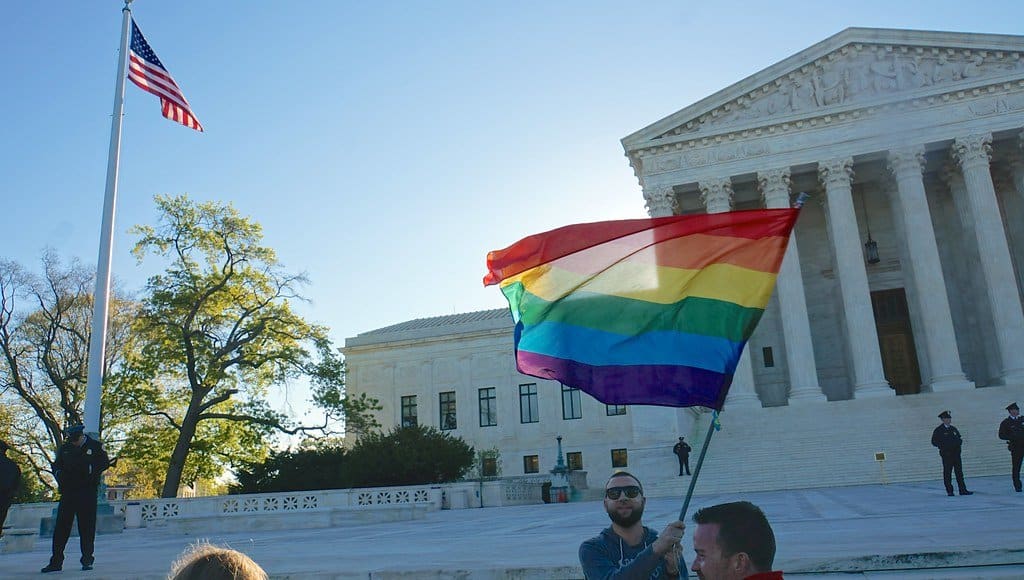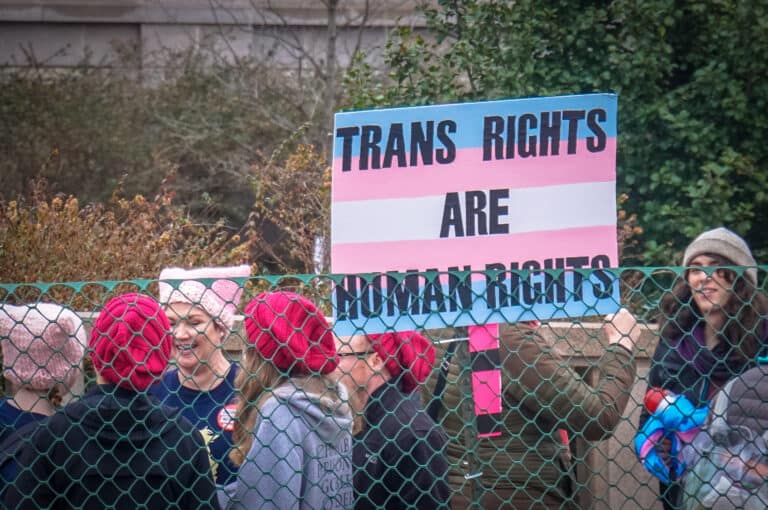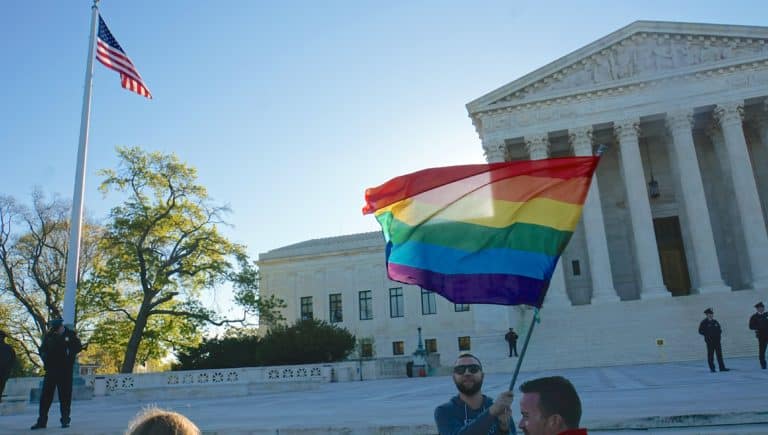Yesterday we reviewed the opening briefs for the employers in Bostock, Zarda, and Harris. Today we begin summarizing the amicus briefs submitted in support.
Amicus Briefs
Religious Groups, Institutions, and Individuals
The Council for Christian Colleges and Universities, the Catholic University of America, Brigham Young University, and 39 other religious colleges and universities say that reading Title VII to cover sexual orientation and gender identity discrimination would have far-reaching consequences for religious institutions of higher education, potentially upsetting their tax-exempt status and accreditation. That reading’s logic, if naturally extended to Title IX, would also undermine the goal of Title IX of empowering women by reducing opportunities for people assigned female at birth. Congress is best positioned to strike the right balance of protections for LGBTQ people and religious institutions.
A group of religious organizations led by the Billy Graham Evangelistic Association argue that the Court should not judicially create employment protections based on sexual orientation and gender identity when Congress and state and local legislatures are already debating this question on their own. The experiences of state and local legislatures in passing pro-LGBTQ measures demonstrate they are best able to specify exactly what they want protected, with some creating specific provisions dealing with adolescents with gender dysphoria, the safety of women, the special case of women in athletics, and religious exercise issues.
A group of religious organizations led by the National Association of Evangelicals claim that a broad reading of Title VII will threaten the free exercise rights of religious employers, including houses of worship, religious educational institutions, and faith-based charities. States that have passed laws protecting LGBTQ employees have shown care in simultaneously enshrining religious protections, which the Court cannot do through the blunt instrument of judicial amendment of Title VII.
A group of self-described Muslim religious and business leaders say that their religious beliefs require them to oppose same-sex intercourse and that the rights of Muslim employees would be threatened by extending Title VII to cover sexual orientation. While Muslim Americans endeavor to help the oppressed, punishment for sins does not constitute oppression.
The Religious Freedom Institute, Islam and Religious Freedom Action Team and a group of Sunni Muslim scholars of Islamic Law write to remind the Court that its decisions in Obergefell and Masterpiece Cakeshop promised protections in the law for sincerely held religious views. Muslims sincerely believe that sex is binary and immutable. They must also follow privacy requirements, such as not sharing a bathroom with unrelated men, in order to fully comply with their religion.
The Center for Religious Expression explains that an employer has a First Amendment right to brand itself through its employee dress code. Title VII cannot be used to compel employers to brand themselves in a different way.
The United States Conference of Catholic Bishops and other religious organizations say in Zarda/Bostock that reading Title VII to encompass sexual orientation discrimination would ensnare courts in constitutional and statutory debates for the foreseeable future, forcing them to determine the line between constitutional protections for religious liberty, association, and speech and the prohibition against sexual orientation discrimination. Writing separately in Harris, they refute the Sixth Circuit’s comparison of gender transition to religious conversion. In its decision, the Sixth Circuit cited Schroer for the proposition that an employer who takes adverse action against an employee for converting from one religion to another discriminates on the basis of religion. It then applied that logic to an employer who takes adverse action against an employee who transitions from one sex to another. The Conference of Catholic Bishops says that the analogy does not work because sex, unlike religion, is an immutable characteristic. Moreover, while an employer’s hostility toward religious conversion is grounded in religious animus, an employer’s hostility toward a “sex change” is not rooted in sexism. The Conference also asserts that an expansive reading of Title VII would cause conflicts with and give rise to constitutional claims from religious believers and religious institutions in the workplace.
The Institute for Faith and Family and Christian Family Coalition says that Price Waterhouse did not create an independent cause of action for sex stereotyping. That decision only sanctioned the consideration of sex stereotyping as evidence of discrimination against men or women as a class.
The First Liberty Institute argues that regardless of whether the Court reads Title VII’s bar against sex discrimination to prohibit sexual orientation and gender identity discrimination, it should clarify that the statute’s religious employer exemption permits religious ministries to employ only people whose beliefs and conduct are aligned with the ministries’ religious values.
Advocates for Faith and Freedom focuses solely on the word “sex,” arguing that its plain and ordinary meaning does not include gender identity or sexual orientation. The Court should not assume Congress’s role and add two categories to Title VII that Congress has chosen not to protect.
A group of people who claim to regret transitioning claim that providing legal affirmation to transgender people only operates to lead those who are experiencing gender identity issues further away from making peace with their bodies.
Women’s, Girls’, and Privacy Organizations
The Women’s Liberation Front, a group of trans-exclusionary radical feminists, say that a decision in favor of Stephens would promote, rather than combat, sex stereotyping. They claim that Stephens is a man who desired to wear a skirt to work, and the argument that anyone who wears a skirt to work is a woman is a sex stereotype. A ruling in favor of Stephens would enshrine such a stereotype into law.
A group of military spouses raise five concerns with a reading of Title VII that prohibits gender identity discrimination. Their concerns are: the erasure of distinctions between men and women, the prioritization of feelings over facts, the coercion of women’s consent to the presence of men in their private spaces, the fear that naturally results from men’s presence in women’s private spaces, and the compulsion of private citizens’ speech and behavior by the government.
The Independent Women’s Forum and 1,013 athletes and parents argues that a decision holding that Title VII’s bar against sex discrimination covers gender identity discrimination will carry over to Title IX. This will undercut Title IX’s goal of expanding opportunities in sports and education for women and girls by creating fewer opportunities for biological females and potentially threatening the operation of single-sex sports.
Defend My Privacy, Citygate Network, Phoenix Dream Center, and students and parents for privacy say that expanding Title VII to protect employees on the basis of their LGBTQ identities would open up private spaces like bathrooms, showers, and locker rooms to people assigned “the opposite sex” at birth. Trauma survivors may experience PTSD, anxiety, and other adverse consequences from the presence of “opposite sex” persons in such spaces. Dress codes also allow survivors to easily distinguish between members of the same and “opposite” sex, a critical tool that will become less useful if people of one sex can adopt the dress code of another. An extended reading of Title VII would also spill over to Title IX and the Fair Housing Act, creating the same problems in schools and housing units.










Daily News & Commentary
Start your day with our roundup of the latest labor developments. See all
July 14
More circuits weigh in on two-step certification; Uber challengers Seattle deactivation ordinance.
July 13
APWU and USPS ratify a new contract, ICE barred from racial profiling in Los Angeles, and the fight continues over the dismantling of NIOSH
July 11
Regional director orders election without Board quorum; 9th Circuit pauses injunction on Executive Order; Driverless car legislation in Massachusetts
July 10
Wisconsin Supreme Court holds UW Health nurses are not covered by Wisconsin’s Labor Peace Act; a district judge denies the request to stay an injunction pending appeal; the NFLPA appeals an arbitration decision.
July 9
the Supreme Court allows Trump to proceed with mass firings; Secretary of Agriculture suggests Medicaid recipients replace deported migrant farmworkers; DHS ends TPS for Nicaragua and Honduras
July 8
In today’s news and commentary, Apple wins at the Fifth Circuit against the NLRB, Florida enacts a noncompete-friendly law, and complications with the No Tax on Tips in the Big Beautiful Bill. Apple won an appeal overturning a National Labor Relations Board (NLRB) decision that the company violated labor law by coercively questioning an employee […]